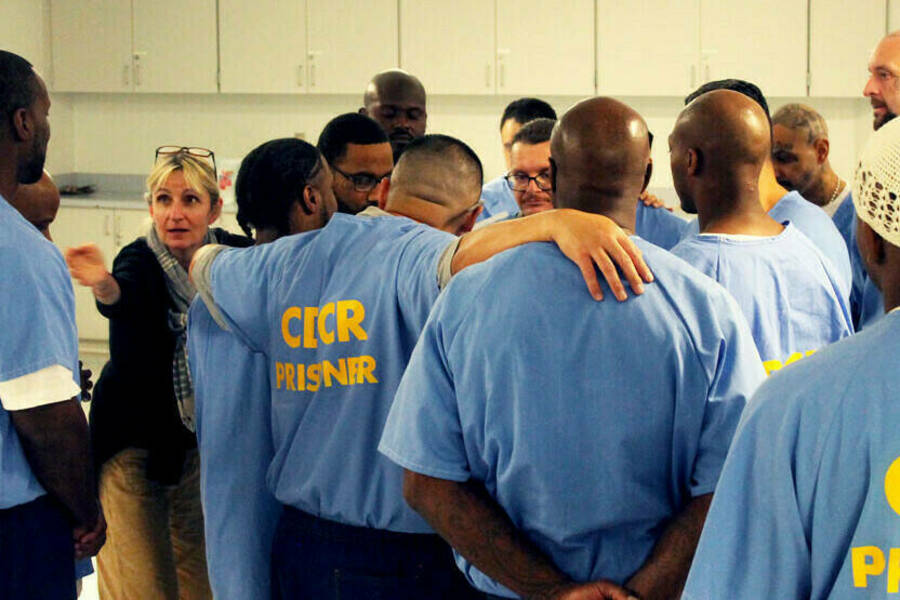Trauma Talks - Compassion Prison Project

Locations
- Compassion Prison Project - Los Angeles, California
Focus Areas
- Criminal Justice
- Health
It is our belief that when each of us heals our own trauma, we’re doing our part to heal the world. So let the healing begin, for everyone, everywhere, especially for the most traumatized people in our society, those living in prison.
The Issue
The three largest mental health facilities in the United States are the New York City Jail, the Chicago Jail and the Los Angeles County Jail. Countless inmates deal with mental health issues and trauma that affect their time in prison. In fact, in one study, 79% of incarcerated men reported 4 or more adverse childhood experiences — such as abuse, parents divorce, domestic violence, or parental addiction — compared to just 15% of the general U.S. population.
These adverse childhood experiences (ACEs) are associated with increased risk for several negative health outcomes, including autoimmune diseases, cancer or lung disease, suicide attempts, opiate addiction, or alcoholism. Additionally, ACEs often perpetuate violence as a solution, which encourages reactivity, impulsivity and other survival behaviors.
Violence is a fact of life for many before, during and after incarceration. About half of individuals in state prisons were sentenced for violent offenses. Within a 6-month window, one fifth of state prisoners are subject to a physical assault.
Finally, re-arrest rates are high for released prisoners. In 2016, 650,000 people were released from state and federal prisons. Among those released from prison, 68% will be re-arrested in three years. Of these rearrests, 3 in 10 are for a violent offense.
For incarceration to achieve its goal of rehabilitation, the circumstances around incarceration must be taken into account. Oftentimes, the link between incarceration and trauma is poverty. Over 80% of people charged with a felony in the United States are impoverished. In fact, a boy from a poor family is 20x more likely to enter prison than one who is not poor.
While the relationship between poverty, trauma and incarceration is well documented in research, many people in prison don’t know they’re traumatized. In-prison programs have the opportunity to bring trauma-informed and compassionate interventions to those that need them most.
The Intervention
The Compassion Prison Project believes that trauma awareness is the first step in ending the the cycle of poverty and the first step in ending child abuse. Their programs seek to understand the roots of inmates’ anti-social behavior so that they move away from fight/flight and dysregulation.
By providing the tools to heal, the Compassion Prison Project aims to transform incarcerated individuals into socially and emotionally regulated members of society.
Trauma Talks is a 16-part video and workbook curriculum pioneered by the Compassion Prison Project. The series brings trauma awareness, education and exercises for healing to reduce violence and improve in-prison behavior. Trauma Talks teaches participants how to emotionally regulate, reignite their sense of hope and purpose, and improve their relationships with family and themselves.
Topics addressed in Trauma Talks include the brain science of trauma, fight/flight, PTSD, the normalization of violence, and more.
Trauma-informed interventions have been demonstrated to reduce mortality beyond prison sentences and reduce the likelihood of suicide. However, participation in in-prison programs is waning. Rigorous evidence is needed to understand the impact of trauma-informed programs on in-prison behavior and reductions in long-term recidivism.
Research Question
What is the impact of trauma-awareness on violence reduction, family relationships, and sense of hope in an incarcerated population?
Intended Outcomes
- Participants in Trauma Talks will break fewer and less serious rules in prison, leading to fewer instances of violence.
- After being released from prison, Trauma Talks participants will return to jail at lower rates, be less violent, and have healthier relationships with their families.
- The presence of Trauma Talks will create a healthier mental and emotional environment for those living and working in prison.
Research Study Design
LEO researchers will use a randomized controlled trial to study the impact of Trauma Talks.
The Compassion Prison Project works in prisons across the state of California. At least two prisons in the California Department of Corrections and Rehabilitation will launch Trauma Talks in 2024. However, because of the number of incarcerated individuals at each location, not all of them can be served immediately.
Incarcerated individuals will be randomized to either treated or control housing units. Among the treated housing units, individuals will be randomly assigned again to either treated cell blocks or control cell blocks. Treated cell blocks will participate in the 16-week Trauma Talks series. Incarcerated individuals will only be included in the study sample if they consent to participate in the study.
LEO researchers will use data from the California Department of Corrections and Rehabilitation to study short-term outcomes in prison, such as rule violation reports. Study participants will also complete a baseline survey on their sense or purpose, belief in the future, and more. These data will illuminate which program mechanisms contribute to positive changes in behavior for incarcerated individuals.